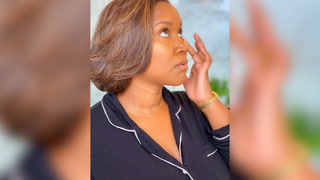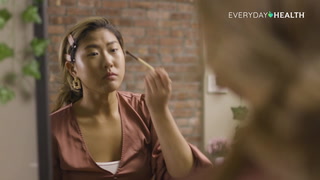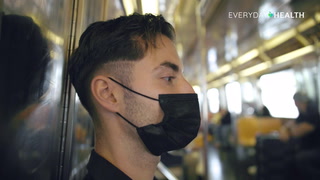‘Skin Care Is My Self-Care’: How a Beauty Blogger Manages Eczema
‘Skin Care Is My Self-Care’: How a Beauty Blogger Manages Eczema

Next up video playing in 10 seconds
When Dana Sellers was in high school, she discovered a love of all things beauty and skin care. “I was the teenager who had a lot of products,” she says. It was a passion that would eventually propel Sellers to launch her popular Beauty in Color blog in 2018.
But Sellers’s interest in skin care stems from another reason, too: As a teenager, she was diagnosed with atopic dermatitis, or eczema, which would flare up in the creases of her arms and legs with scaly, itchy patches of skin. After her diagnosis, she learned the hard way that she couldn’t apply just anything to her skin.
“When I was a teenager, I loved Bath & Body Works,” she says, recalling a time she purchased scented body gel and lotion from the store. “I mean, who doesn’t? They smell amazing.”
As soon as she used these products, though, she immediately noticed they irritated her skin. The following day, she developed a flare that was “the worst experience” of her life. The pain was so bad, she says, that she scratched her skin until it bled.
“I learned that fragrance is something that I cannot use,” she says.
A Skin-Care Routine for Both Eczema and Anti-Aging

Over the years, Sellers has learned which products can help her skin stay hydrated — something that’s important for people with eczema, since the skin doesn’t retain enough moisture with the condition. She’s even found that, in some cases, certain products marketed for people who have eczema can cause more harm than good.
“Some of the topical creams that help soothe irritation ... [can] actually cause dryness later on,” she says. “I really like to find products that not only help prevent the irritation, but that you can also use consistently, so you don’t have as many eczema flare-ups.”
Managing eczema, she’s found, is more than keeping your skin blemish free or covering it up with makeup. In fact, Sellers has learned that it’s not always worth it to hide her eczema under layers of concealer, partly because makeup can contain irritating ingredients that trigger itchiness later on.
For Sellers, the itch of eczema is one of the hardest symptoms to deal with. “I can feel like I have creepy crawlers on my body,” she says. “It’s come to the point, especially in New York City, where I thought I might’ve had bedbugs.”
Plus, to Sellers, beauty goes beyond foundation and bronzer. “I’m someone who doesn’t really like to wear makeup,” she says. “I like to really go out natural.”
On her blog, Sellers focuses primarily on skin care, including which products can keep skin looking and feeling healthy. She credits her skin-care routine with keeping her complexion the same today as it was a decade ago.
When it comes to anti-aging products, Sellers is a fan of retinols, but she prefers to use them in oil form, which she finds less irritating than retinols in creams, serums, and gels. She also knows to avoid using multiple anti-aging ingredients at once — and to always hydrate her skin.
She follows a pared-down version of a customizable regimen known as the 10-step Korean skin-care routine. “I personally don’t feel like I need 10 steps,” she says.
Dana's Morning Routine
- Gentle cleanser
- Vitamin C serum
- Hyaluronic acid
- Moisturizer
- Sunscreen

Dana's Evening Routine
- Oil cleanse
- Nondrying cleanser
- Hyaluronic acid
- Ceramides
- Moisturizer
- Face oil (as needed)

In the morning, Sellers uses a gentle cleanser on her skin, followed by a vitamin C serum. She keeps her skin hydrated by applying hyaluronic acid and moisturizer and protects it from the sun with sunscreen. In the evening, she often double-cleanses, first with an oil cleanser and then with a nondrying cleanser. Then she layers on hydrating products, such as hyaluronic acid, ceramides, moisturizer, and sometimes face oil.
It’s a routine that is as soothing as it is revitalizing, and that, says Sellers, is the point. She no longer uses products to hide her eczema if they’re going to trigger more irritation or skin issues in the future. When someone asks her about an inflamed patch of skin, she simply tells them that she has eczema, which is something she has learned to deal with.
“When I was younger … I was more concerned about what my skin looked like and how it was going to be perceived by my friends,” she says. “Now, it’s about just making sure I feel good.”
Blogging About Beauty With Eczema
For Sellers, skin care is a form of self-care. “It’s a way for me to calm down and rejuvenate myself,” she says. This type of thinking — along with the urging of her family and friends, who noticed that Sellers “could not stop talking” about beauty products — was the main reason Sellers started her blog.

Writing about beauty and skin-care products is something she’s passionate about and would have loved to read about when she was younger. “When I was in high school, most of the blogs and content creation were focused more on makeup than skin care,” she says.
Sellers also wanted to talk about skin care and eczema from her perspective as a Black woman.
“Beauty is colorful,” she says. “I think it’s nice to hear information from someone who you can relate to ... to see a Black woman who has eczema and deals with skin care and beauty.”
On her blog, Sellers also shares how she prevents breakouts and eczema flares, which she learned through trial and error with her own skin — along with lots of research. “There’s so much information and misinformation out there,” she says. “It’s really nice to be able to help people who have issues and don’t really know how to manage it.”
All images provided by Dana Sellers.
This video interview took place in September 2021.
- Kaufman B et al. Eczema in Skin of Color: What You Need to Know. National Eczema Association. September 22, 2023.
- Alvarado SM et al. Representation of Dark Skin Images of Common Dermatologic Conditions in Educational Resources: A Cross-Sectional Analysis. Journal of the American Academy of Dermatology. May 2021.

Jacquelyn Dosal, MD
Medical Reviewer
Jacquelyn Dosal, MD, is a board-certified dermatologist at Skin Associates of South Florida in Coral Gables. She practices general, medical, cosmetic, and surgical dermatology.
Dr. Dosal provides compassionate care to all her patients, listening to their concerns and creating a treatment plan with each patient's priorities and real life in mind.
She is a member of the voluntary faculty at the University of Miami.

Maria Masters
Author
Maria Masters is a contributing editor and writer for Everyday Health and What to Expect, and she has held positions at Men's Health and Family Circle. Her work has appeared in Health, on Prevention.com, on MensJournal.com, and in HGTV Magazine, among numerous other print and digital publications.

